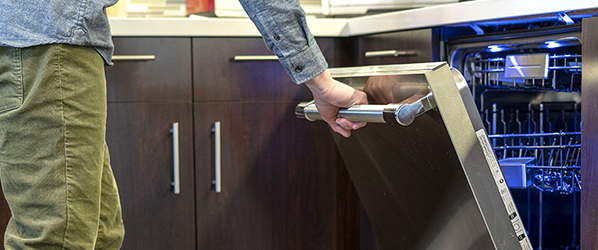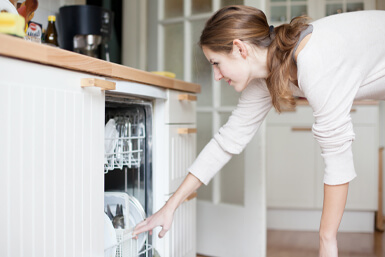Exploring Appliance Issues: What You Should Know
Exploring Appliance Issues: What You Should Know
Blog Article
We've uncovered this great article on How to Troubleshoot & Repair a Dishwasher down the page on the web and decided it made sense to write about it with you over here.

Having your dishwashing machine break down or malfunction can be a big deal as well as trigger some discomfort in your home. Dish washers are equipments that we utilize to clean dishes and flatwares automatically to conserve us the tension of manually doing it.
Like every other equipment that alleviates human initiative, dish washers can break down and develop some mistake at some time in time. There are numerous faults your dish washer might create, and also while a few of them can be addressed by replacing some parts or repairing them, other more extreme defects will call for that you get a new dishwasher.
This short article will certainly identify a few common faults your dishwashing machine could develop to impede its overall efficiency and also how these faults can be solved.
Usual Mistakes
Typical dish washer faults can range from minor to major ones. Relying on the level, you will certainly either need the solutions of specialist plumbers to repair or change it.
A few of the most usual mistakes consist of:
Dripping Dishwasher
This is possibly one of the most everyday dish washer problem, and the bright side is that it is easy to recognize. Leakages take place as a result of numerous factors, and also the leakages can ruin your cooking area. Common sources of dish washer leakages include;
If your meals as well as cutleries appear of the dish washer as well as still look unclean or unclean, your spray arms might be a trouble. Oftentimes, the spray arms can obtain clogged, and also it will call for a quick tidy or a replacement to work properly once more.
Failure to Drain pipes
Sometimes you may see a huge amount of water left in your tub after a clean. That is probably a water drainage issue. You can either examine the drain pipe for damages or blockages. When doubtful, speak to a specialist to have it inspected and also fixed.
This is one more usual dishwashing machine problem, and it is primarily caused by food particles or grease lingering in the machine. In this case, try to find these fragments, take them out as well as do the meals with no dishes inside the machine. Wash the filter extensively. That will certainly aid remove the negative odor. Make sure that you eliminate every food fragment from your recipes before moving it to the machine in the future.
Final thought
A few of these common dish washer faults can be dealt with conveniently in the house, however in many cases, the faults could be huge and also may require the attention of experts. If you live in Rochester, Syracuse, as well as other parts of America, allowed the professionals appropriately diagnose what could be wrong with your dishwashing machine and also extend a solution.
We additionally mount dishwashers if you just bought a new one or intend to replace your own. With our years of experience in the industry, we are sure to give you the very best possible services.
7 Common Dishwasher Problems (and How to Fix Them)
Dirty, smelly, possibly covered in cheese. Is there anything more frustrating than opening the dishwasher only to find the dirty dishes are still there?! I mean, the main reason you buy a dishwasher is so you don’t have to deal with dirty dishes. C’mon dishwasher, you had one job.
A little maintenance goes a long way when it comes to appliances, but the truth is nothing lasts forever (sadly). That doesn’t mean it’s hopeless, though. With a handful of simple tricks, you can fix some of the most common dishwasher problems and bring that sparkle back into your dishwasher and back into your life.
My Dishes Are Still Dirty
This is at the top of a list for a reason. Dirty dishes are common and frustrating. Easy fixes first; check if your dishwasher has a manual filter and make sure that it’s clean and clear of debris. Then, as you load your dishwasher, make sure that the spray arms can rotate freely, spraying water throughout the drum. If they’re blocked or obstructed, you won’t be getting optimal cleaning performance. If the problem continues, check if your spray arms are clean and moving freely as grease and food particles can prevent them from spinning.
Also, stop pre-rinsing your dishes! Modern dishwashers use sensors to determine the soil level of the dishes. If you rinse them off too much, your dishwasher may select a shorter cycle than is necessary. Modern detergents also use enzymes that activate when they come in contact with food particles. If you remove the particles, your detergent will be less effective too.
My Dishes Aren’t Drying
The easiest fixes here are to add Rinse Aid to your dishwasher when you start the load to assist drying, and to make sure you don’t stack plastic against plastic or other hard to dry materials. It’s also a good idea to open the dishwasher door when the cycle is complete to release steam and prevent condensation from settling on your dishes (some higher-end machines even open automatically). If your dishwasher has a heating element, you may have to check if it is working properly. Check also the fan if your dishwasher has a stainless steel tub that uses blown radiant heat to dry.
My Dishwasher Smells Bad
If your dishwasher smells bad, make sure your filter and screens are cleaned of any grime and food residue. Check the spray arms and gasket on the door to make sure there’s no grease or food waste there as well. If you’ve done that, then it may just be time to sanitize the drum. Place a small bowl with vinegar in the upper basket of your empty dishwasher and run the sanitize cycle (or the hottest cycle you’ve got) to blast away bad odours.
My Dishwasher Won’t Start
If your dishwasher won’t start there’s often an electrical problem, and if you’re lucky that means there’s a very easy fix. Ask yourself, have I tried turning it off and on? If not, then do that. If it’s still not working, try unplugging and re-plugging in the machine and double-check your breaker to make sure power is feeding the unit. If it’s a mechanical problem, then it may be that your door isn’t latching properly and a simple realignment will get things sorted out.
My Dishwasher Won’t Fill
If possible, check your intake valves and make sure that the screen is clear and that there’s no blockage obstructing water flow. If that’s not it, then the float and/or float switch located at the bottom of the drum could be the problem. Make sure that the electrical connections are intact and that the mechanism hasn’t been damaged or blocked in any way.
https://www.wardells.ca/blog/7-Common-Dishwasher-Problems--and-How-to-Fix-Them-

Hopefully you enjoyed our section on Common Dishwasher Problems. Thank you for taking the time to read our blog post. If you liked our article please do not forget to share it. I praise you for your time. Visit again soon.
This Resource Report this page